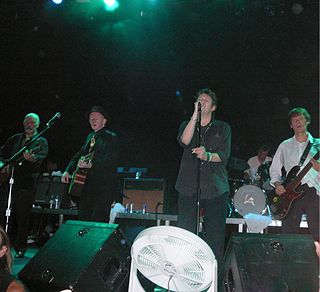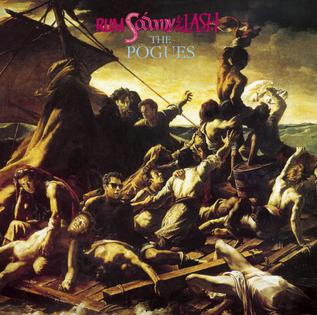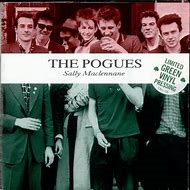
The Pogues were an English or Anglo-Irish Celtic punk band fronted by Shane MacGowan and others, founded in King's Cross, London, in 1982, as Pogue Mahone—an anglicisation by James Joyce of the Irish phrase póg mo thóin, meaning "kiss my arse". Fusing punk influences with instruments such as the tin whistle, banjo, cittern, mandolin and accordion, the Pogues were initially poorly received in traditional Irish music circles—the noted musician Tommy Makem called them "the greatest disaster ever to hit Irish music"—but were subsequently credited with reinvigorating the genre. The band later incorporated influences from other musical traditions, including jazz, flamenco, and Middle Eastern music.

"Lord Randall", or "Lord Randal", is an Anglo-Scottish border ballad consisting of dialogue between a young Lord and his mother. Similar ballads can be found across Europe in many languages, including Danish, German, Magyar, Irish, Swedish, and Wendish. Italian variants are usually titled "L'avvelenato" or "Il testamento dell'avvelenato", the earliest known version being a 1629 setting by Camillo il Bianchino, in Verona. Under the title "Croodlin Doo" Robert Chambers published a version in his "Scottish Ballads" (1829) page 324.

Rum Sodomy & the Lash is the second studio album by the London-based, Irish folk punk band the Pogues, released on 5 August 1985. The album reached number 13 on the UK charts. The track "A Pair of Brown Eyes", based on an older Irish tune, reached number 72 on the UK singles chart. "The Old Main Drag" later appeared on the soundtrack to the film My Own Private Idaho.

If I Should Fall from Grace with God is the third studio album by Celtic folk-punk band the Pogues, released on 18 January 1988. Released in the wake of their biggest hit single, "Fairytale of New York", If I Should Fall from Grace with God also became the band's best-selling album, peaking at number three on the UK Albums Chart and reaching the top ten in several other countries.
Jeannie Robertson was a Scottish folk singer.

Red Roses for Me is the debut studio album by the London-based band the Pogues, released on 15 October 1984. It was produced by Stan Brennan, who had managed the Nipple Erectors/The Nips and Rocks Off Records shop in London.
"Foggy Dew" or "Foggy, Foggy Dew" is an English folk song with a strong presence in the South of England and the Southern United States in the nineteenth century. The song describes the outcome of an affair between a weaver and a girl he courted. It is cataloged as Laws No. O03 and Roud Folk Song Index No. 558. It has been recorded by many traditional singers including Harry Cox, and a diverse range of musicians including Benjamin Britten, Burl Ives, A.L. Lloyd and Ye Vagabonds have arranged and recorded popular versions of the song.

Philip Ryan, professionally known as Philip Chevron, was an Irish singer-songwriter and guitarist and record producer. He was best known as the lead guitarist for the celtic punk band The Pogues and as the frontman for the 1970s punk rock band The Radiators from Space. Upon his death in 2013, Chevron was regarded as one of the most influential figures in Irish punk music.
Caitlín O'Riordan is a British musician. She played bass guitar for the Irish punk/folk band the Pogues from 1983 to 1986. She later played with Elvis Costello as well as Bush Tetras and several other projects. She uses the name Rocky O'Riordan on social media and for her Sirius-XM radio show, The Rocky O'Riordan Show.

"Dirty Old Town" is a song written by Ewan MacColl in 1949 that was made popular by The Dubliners and The Pogues.

"Matty Groves", also known as "Little Musgrave and Lady Barnard" or "Little Musgrave", is a ballad probably originating in Northern England that describes an adulterous tryst between a young man and a noblewoman that is ended when the woman's husband discovers and kills them. It is listed as Child ballad number 81 and number 52 in the Roud Folk Song Index. This song exists in many textual variants and has several variant names. The song dates to at least 1613, and under the title Little Musgrave and Lady Barnard is one of the Child ballads collected by 19th-century American scholar Francis James Child.

"The Raggle Taggle Gypsy" (Roud 1, Child 200), is a traditional folk song that originated as a Scottish border ballad, and has been popular throughout Britain, Ireland and North America. It concerns a rich lady who runs off to join the gypsies (or one gypsy). Common alternative names are "Gypsy Davy", "The Raggle Taggle Gypsies O", "The Gypsy Laddie(s)", "Black Jack David" (or "Davy") and "Seven Yellow Gypsies".
"The Wild Rover" is a very popular and well-travelled folk song. Many territories have laid claim to having the original version.
"Edward" is a traditional murder ballad existing in several variants, categorised by Francis James Child as Child Ballad number 13 and listed as number 200 in the Roud Folk Song Index. The ballad, which is at least 250 years old, has been documented and recorded numerous times across the English speaking world into the twentieth century.

"The Twa Brothers" is a traditional ballad existing in many variants.
"Greenland Whale Fisheries" is a traditional sea song. This song originated in the West Indies. In most of the versions collected from oral sources, the song opens up giving a date for the events that it describes. However, the song is actually older than this and a form of it was published as a ballad before 1725. It has been given a Roud number of 347.
"A Pair of Brown Eyes" is a single by The Pogues, released on 18 March 1985. The single was their first to make the UK Top 100, peaking at Number 72. It featured on the band's second album, Rum Sodomy & the Lash, and was composed by Pogues front man Shane MacGowan. Its melody is loosely based on that of “Wild Mountain Thyme", a song by Francis McPeake in a traditional folk style.

"Sally MacLennane" was a single released by The Pogues in 1985. It was the second single by the band to make the UK Top 100, reaching number 54. The song was composed by Shane MacGowan and featured on the band's second album, Rum Sodomy & the Lash. The song is based on a bar his uncle owned which served Irish Ford workers in Dagenham.

Poguetry in Motion is an EP by The Pogues, released on Stiff Records in the UK on 24 February 1986, and in the US & Canada on MCA Records. It was the band's first single to make the UK Top 40, peaking at number 29 and the first Pogues recording to feature Philip Chevron and Terry Woods.











